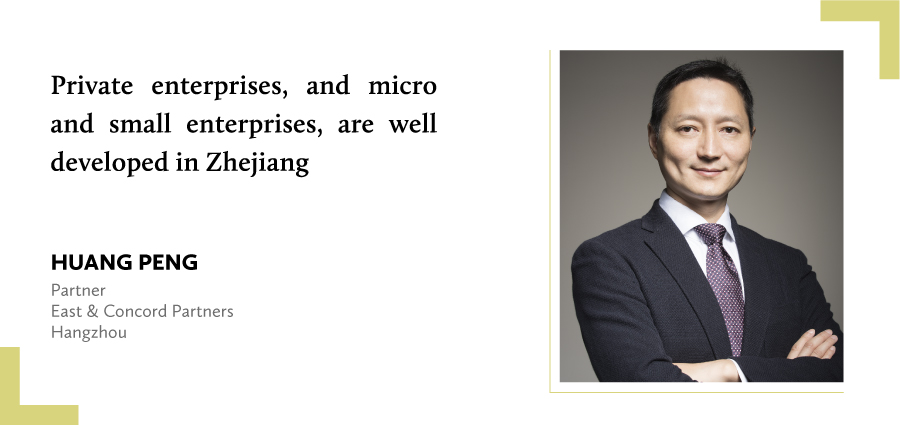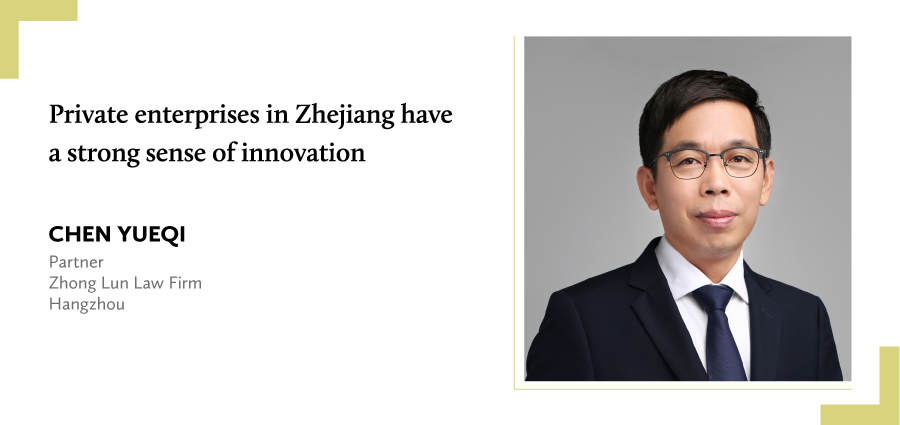Zhejiang province is home to China’s silicon valley, Hangzhou, and is at the heart of the country’s innovation drive. With the blistering growth of the region’s private enterprises, Zhejiang’s legal market is among the hottest in the country, and the dominance of local firms makes the market a hard nut to crack for big national players, writes Miao Sha
Located where the southern flank of the Yangtze River Delta meets the East China Sea, Zhejiang is one of the smallest provinces in China, yet it punches above its weight with its prosperous economy.
According to the local statistics bureau, Zhejiang’s GDP reached RMB6 trillion (USD9.3 billion) in 2020, with the provincial capital Hangzhou alone having a GDP of RMB1.6 trillion.
Bullish private enterprises with a thirst for innovation have bolstered capital markets and sown the seeds for a robust legal services sector, one that seems strong enough to compete with national law firms wanting in on the market. So, what are the secrets for the province’s success?
Zhejiang business heritage
“Private enterprises, and micro and small enterprises, are well developed in Zhejiang … but in terms of heavy industry, state-owned enterprises and large foreign-invested enterprises, it cannot compare with the likes of Shanghai, Beijing or Jiangsu,” says Huang Peng, an Hangzhou-based partner of East & Concord Partners.
Private enterprises are a key component of the economy, with e-commerce giant Alibaba, Nongfu Spring (which rocketed its founder into the ranks of China’s most wealthy) and the nation’s largest private car manufacturer, Geely Holdings, all headquartered in Zhejiang.
Private enterprises are also popular with investors. “Private enterprises in Zhejiang have a strong sense of innovation, not sparing in their outlays on technical innovation, model innovation and management innovation in the course of industrial transformation and upgrading,” says Chen Yueqi, a partner in the Hangzhou office of Zhong Lun Law Firm.
These flourishing enterprises have also boosted the development of local capital markets. “Private capital has always been on the move in Zhejiang, and investment and financing demand is strong, providing wide room for the development of the finance industry,” says Xia Yongjun, the managing partner of DeHeng Law Offices’ Hangzhou branch.
Zhejiang enterprises have set a brisk pace in listings. According to the Zhejiang office of the China Securities Regulatory Commission (CSRC), 62 enterprises from the province listed in China in 2020, accounting for 15.7 % of all new listings, ranking it first in the country.
“The conditions for domestic stock offerings have become simpler and easier, and more inclusive, encouraging and galvanising a large number of enterprises to begin the process of going public,” says Liu Bin, a partner at T&C Law Firm’s Hangzhou headquarters.
Xia notes that Zhejiang enterprises have also been active in offshore IPOs which, coupled with the implementation of the registration system, has improved the efficiency of enterprise listings. A number of reforms have been made in China’s capital markets recently. In March 2019, the Star Market, which has implemented the registration system, was launched. In March 2020, the new Securities Law was officially implemented, closely followed by the implementation of the registration system on the second boards in late August.
“After listing, enterprises also raise financing through certain equity financing instruments, such as additional public offerings, additional private offerings of preference shares, convertible bonds and corporate bonds, to enhance their funding security in the course of their development,” says Chen Yueqi, at Zhong Lun.
The liveliness in local capital markets cannot be divorced from government support and a good business environment. In 2016, Zhejiang’s government launched a reform to improve administrative efficiency by seeking to ensure that people and enterprises need to “go a maximum of one time” to the government to handle any matter.
The enhancement in government efficiency has been of great benefit to enterprises. According to the Zhejiang Development and Reform Commission, as at the end of December 2020, a “maximum of 80 days” had been realised for the approval of all investment projects for ordinary enterprises in Zhejiang province, with the average time required for approvals of investment projects dropping from 192 days in 2016 to less than 80 days in 2020.
In 2017, the Zhejiang government also launched the Phoenix programme to develop capital markets through enterprise equity reform, acquisition/restructuring and other such means. According to a local government report, as at the end of November 2020, an additional 238 Zhejiang enterprises had listed in China or abroad since the launch of the programme, bringing the total to 641 listed companies.
In the face of growing demand in capital markets, local lawyers have also been keen to seize new opportunities. “The issue of intergenerational passing down of Zhejiang business enterprises has increasingly come to the fore, and the demand for family non-litigation and wealth management legal services has grown sharply,” says Shi Lijia, a partner at High Mark Law Firm in Hangzhou.
You must be a
subscribersubscribersubscribersubscriber
to read this content, please
subscribesubscribesubscribesubscribe
today.
For group subscribers, please click here to access.
Interested in group subscription? Please contact us.























